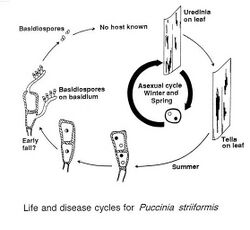Biology:Puccinia striiformis var. striiformis
| Puccinia striiformis sensu lato | |
|---|---|
| Scientific classification | |
| Kingdom: | |
| Phylum: | |
| Class: | Urediniomycetes
|
| Subclass: | |
| Order: | |
| Family: | |
| Genus: | |
| Species: | Puccinia striiformis sensu lato
|
| Binomial name | |
| Puccinia striiformis Westend., (1854)[1]
| |
| Synonyms | |
|
List
| |
Puccinia striiformis is a fungal species and plant pathogen. It causes stripe rust on wheat, but has other hosts as well. The species is common in Europe and in more recent years has become a problem in Australia .[2] Crop infections can cause losses of up to 40%, and the fungus will infect both winter wheat and spring wheat.[3]
Taxonomy
The taxonomy of P. striiformis was revised by Liu & Hambleton in 2010. These strains – commonly called stripe rusts of wheat and other grasses – were redefined as a sensu lato and separated into four species based on molecular and morphological studies: Puccinia striiformis sensu stricto (on Aegilops, Elymus, Hordeum and Triticum spp.), Puccinia pseudostriiformis (on Poa spp.), Puccinia striiformoides (on Dactylis glomerata, which Liu & Hambleton believe to generalize to all Dactylis) and Puccinia gansensis (a sp. nov. they find on Achnatherum inebrians).[4] P. striiformis, can greatly decrease wheat yield in northern Punjab and Khyber Pakhtunkhwa (NWFP).[citation needed]
See also
References
- ↑ Westend., Bull. Acad. R. Sci. Belg., Cl. Sci. 21(no. 2): 235 (1854)
- ↑ Bushnell, William Rodgers; Roelfs, Alan P. (1984). The Cereal Rusts: Origins, specificity, structure, and physiology. Academic Press. ISBN 978-0-12-148401-9.
- ↑ Puccinia striiformis. Cereal Disease Laboratory, USDA ARS]
- ↑
- He, Mao-Qiang; Zhao, Rui-Lin; Hyde, Kevin D.; Begerow, Dominik; Kemler, Martin; Yurkov, Andrey; McKenzie, Eric H. C.; Raspé, Olivier et al. (2019). "Notes, outline and divergence times of Basidiomycota". Fungal Diversity (Springer Science and Business Media LLC) 99 (1): 105–367. doi:10.1007/s13225-019-00435-4. ISSN 1560-2745. PMID 20943198.
- Wellings, Colin R. (2011). "Global status of stripe rust: a review of historical and current threats". Euphytica (Springer Science and Business Media LLC) 179 (1): 129–141. doi:10.1007/s10681-011-0360-y. ISSN 0014-2336.
- Chen, Wanquan; Wellings, Colin; Chen, Xianming; Kang, Zhengsheng; Liu, Taiguo (2014). "Wheat stripe (yellow) rust caused by Puccinia striiformis f. sp. tritici". Molecular Plant Pathology (John Wiley & Sons, Inc.) 15 (5): 433–446. doi:10.1111/mpp.12116. ISSN 1464-6722. PMID 24373199.
- Hovmøller, Mogens S.; Sørensen, Chris K.; Walter, Stephanie; Justesen, Annemarie F. (2011). "Diversity of Puccinia striiformis on Cereals and Grasses". Annual Review of Phytopathology (Annual Reviews) 49 (1): 197–217. doi:10.1146/annurev-phyto-072910-095230. ISSN 0066-4286. PMID 21599494.
- Chen, Xianming; Kang, Zhensheng (2017). Stripe Rust. Springer Science+Business Media B.V.. pp. vii+719. doi:10.1007/978-94-024-1111-9. ISBN 978-94-024-1109-6.
- These reviews cite this research.
- Liu, Miao; Hambleton, Sarah (2010). "Taxonomic study of stripe rust, Puccinia striiformis sensu lato, based on molecular and morphological evidence". Fungal Biology (Elsevier BV) 114 (10): 881–899. doi:10.1016/j.funbio.2010.08.005. ISSN 1878-6146. PMID 20943198.
Wikidata ☰ Q1499415 entry
 |


